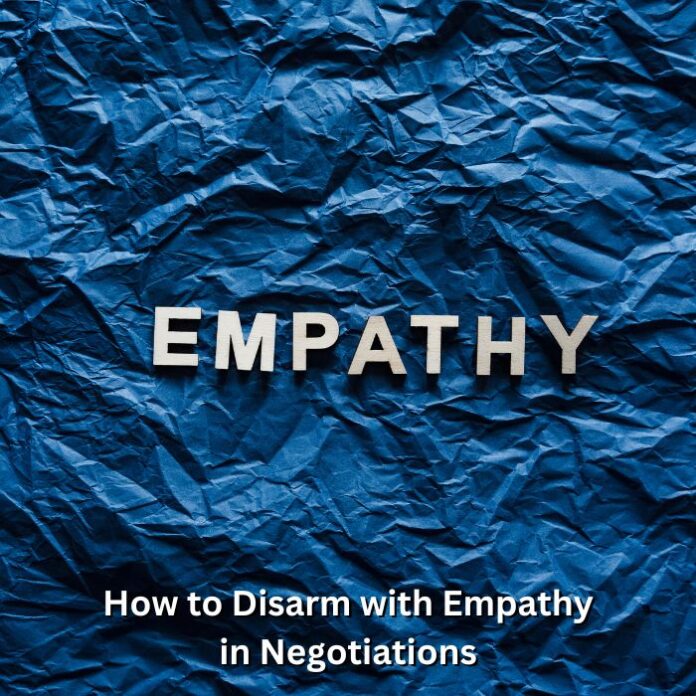Negotiations can sometimes feel like a high-stakes poker game, with each party guarding their cards closely and strategizing their next move. But what if, instead of focusing solely on winning, we shifted our approach to one centered around empathy?
By leading with empathy, you disarm the situation, creating a space where both parties feel heard and understood. Instead of doubling down on your demands, I invite you to pause and genuinely consider the other person’s perspective, to listen actively, acknowledging their concerns and emotions without judgment. Doing so builds trust and lays the foundation for mutually beneficial agreements.
Debunking the Myth
Sadly, we’re conditioned to see empathetic approaches as a sign of weakness, or ‘giving in’. This is a destructive misconception (and one that led me to create the Art of Feminine Negotiation™ method and models as a modern alternative). Empathy doesn’t require abandoning your own goals or principles; rather, it encourages to find common ground and explore creative solutions that meet both parties’ needs. Confronting conflict does not require a need for competitive attitudes; instead, addressing empathetic aspects, valuing cooperation, and maintaining relationships can be a more positive change to navigating negotiations. Setting a positive tone is often undervalued in negotiations, but an active pursuit of a resolution does not also mean sacrificing the merits of empathy.
Put Yourself in the Shoes of the Other Party
Incorporating empathy into negotiations involves cultivating a mindset of genuine understanding and connection. This means taking the time to put yourself in the other individual’s shoes, recognizing their perspective, motivations, and underlying concerns. By prioritizing empathy, potential conflicts can be diffused and pave the way for more collaborative or sustainable agreements.
Listen & Understand
To listen to the other party and acknowledge the root of the issue also means to understand their position as much as you understand your own. Active listening is a crucial factor in reaching a resolution with efficiency. By adopting empathy in your negotiating approach, negotiations do not have to solely be about winning or losing but can be about finding shared interests to achieve an equitable resolution.
Diffuse Emotion
Negotiations can be intense and high stakes, often involving conflicting interests and strong emotions. In this dynamic environment, the power of empathy can be a game-changer. In situations that can become tense or confrontational, especially when parties feel defensive or misunderstood, empathy acts as a natural antidote to tension by creating a safe and respectful environment. Demonstrating genuine empathy by understanding and acknowledging the other person’s perspective creates a connection based on mutual respect. This connection lays a solid foundation for constructive dialogue and collaboration, making it easier to navigate through challenging negotiation issues.
Uncover Hidden Needs
An empathetic approach can lead to uncovering underlying needs and motivations. Actively listening to concerns can gain valuable insights into what truly matters to the other party. This understanding goes beyond surface-level demands and allows you to identify creative solutions that address everyone’s interests.
Find Common Ground Through Caring
Empathy is a powerful tool for fostering win-win solutions in negotiations. By genuinely caring about the other party’s needs and aspirations, you can collaborate more effectively towards outcomes that benefit both sides. Empathetic negotiators are skilled at finding common ground, exploring creative options, and generating agreements that satisfy everyone involved. This collaborative approach not only leads to better deals but also strengthens relationships for future interactions.
Enhance Communication Through Empathy
Effective communication is at the heart of successful negotiations, and empathy plays a central role in enhancing communication skills. When you approach negotiations with empathy, you become better at articulating your own interests in a way that resonates with the other party. When you demonstrate empathy during negotiations, you show that you value the relationship and care about the other party’s well-being. This sets the stage for ongoing collaboration, trust, and respect in future interactions, leading to more productive partnerships over time.
In short, incorporating empathy into your negotiation approach is a powerful strategy for achieving positive outcomes while fostering meaningful relationships. By embracing empathy as a guiding principle in negotiations, you can transform conflicts into opportunities, elevate your negotiation skills, and cultivate a reputation as a collaborative and effective negotiator.





